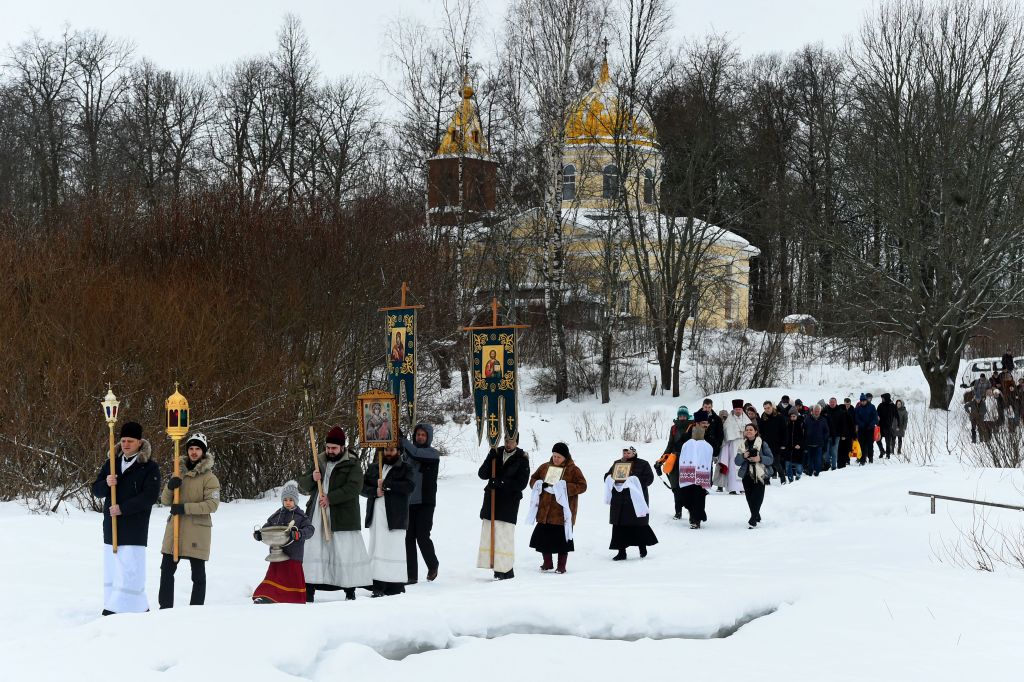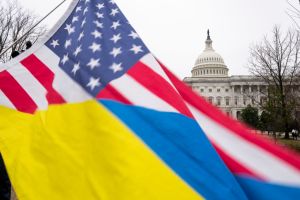Christopher Hitchens, allergic to the idea that secular regimes might actually be more bloodthirsty than religious ones, infamously attempted to blame the atrocities of Stalin’s Soviet Union on the Russian Orthodox Church. It was an end run worthy of the NFL Hall of Fame, and no doubt Hitch would be attempting something similar if he’d lived to see Russian President Vladimir Putin’s invasion of Ukraine.
He would be wrong, but as Putin fights to reclaim territory once held by the Soviet and tsarist empires, the church appears to be conducting its own parallel campaign of spiritual imperialism.
There’s little doubt Putin sees the church as politically useful. Russians attend church at dismally low rates, but the percentage of Russians who self-identify as members of the country’s Orthodox church has skyrocketed since the fall of the Soviet Union. Orthodoxy has effectively replaced Marxism-Leninism as the spiritual bedrock of Russian nationalism. The close ties between church and state also allow Putin to present himself as the defender of traditional values against the godless West. His critiques of American and European degeneracy are often accurate, but they ring somewhat hollow coming from the leader of the country with the highest abortion rate in the world.
Putin, for his part, scratches the church’s back by using state power to persecute Baptists and other Christian sects that might steal sheep from Orthodoxy.
This symbiotic relationship extends beyond Russia’s borders. In Ukraine, the cradle of Russian Orthodoxy, the church is split into two factions. After the Soviet Union fell, the Ukrainian Orthodox Church – Moscow Patriarchate (UOC-MP) remained under the authority of the patriarch of Moscow. Other factions in the church sought total independence (or “autocephaly”) which Ecumenical Patriarch Bartholomew of Constantinople, who is first among equals in the Orthodox Church, granted in 2019, creating the Orthodox Church in Ukraine (OCU).
This decision prompted the Russian Orthodox Church to break communion with the Ecumenical Patriarch, who oversees Ukrainian churches in the global diaspora. Orthodox Christian’s under Bartholomew’s authority can still receive the Eucharist at Russian Orthodox parishes, and vice versa, but clergy from the two churches are prohibited from celebrating the Eucharist together.
The ROC considers Bartholomew to have interfered in Moscow’s jurisdiction. Unlike the Roman Catholic pope, the Ecumenical Patriarch does not exercise direct authority over the entire church. In the late 17th century, the Ecumenical Patriarch of Constantinople gave the Patriarch of Moscow authority over the church in Ukraine. According to Religion News Service, “The Russian Orthodox Church says that was a permanent transfer. The Ecumenical Patriarch says it was temporary.”
The two also disagree as to who has the power to grant autocephaly. According to Moscow, any autocephalous church can grant autocephaly to any national church under its authority. The ROC did just that in 1970, when it declared the Orthodox Church in America to be autocephalous, a status Bartholomew continues to dispute. According to Constantinople, granting autocephaly is the exclusive prerogative of the Ecumenical Patriarch.
I reached out to Fr. Victor Potapov, the rector of the Russian Orthodox Cathedral of St. John the Baptist in Washington, D.C., to ask for a Russian Orthodox perspective on the conflicts, both military and ecclesial. He told me his flock includes Russians and Ukrainians who have so far avoided conflict by refraining from discussing politics, but he did provide me with some useful answers.
On the disputes within Orthodoxy, Fr. Victor unsurprisingly took a pro-Russian line. He called Bartholomew’s decision to grant autocephaly to the OCU an “incursion into the canonical territory of the Russian Orthodox Church” and referred dismissively to “the so-called autocephalous” church.
In his email to me, Fr. Victor said the “largest Orthodox Church in Ukraine is” the UOC-MP, “headed by Metropolitan Onuphry,” who he called “a saintly man.”
I can’t speak to Onuphry’s holiness, but Fr. Victor’s numbers appear to be a bit off. According to data from 2021, almost three-quarters of Ukrainians identify as Orthodox. Of those, 58 percent belong to the OCU, led by Metropolitan Epiphanius, while 25 percent belong to the UOC-MP. An additional 12 percent, probably a mix of pious babushkas far too holy to worry about such things and nominal believers who wouldn’t know a matushka from a chotki, identify as “just Orthodox.”
Assuming the fence sitters fall proportionally into the Russian and Constantinopolitan factions, that would mean the OCU’s membership outnumbers that of the UOC-MP by at least two to one.
Fr. Victor also wrote that “Ukrainian nationalists” and “neo-fascist nationalists” have pressured and persecuted the UOC-MP and even forced many of its parishes to close. It’s hard to gauge the extent to which this is actually happening, but Epiphanius seems to have been, at the very least, concerned about the possibility. Just two days before the invasion began, he urged members of the OCU not to engage in violence against the members or property of the Russian-aligned church. Such “provocations,” Epiphanius said, would be “in the interests of the aggressor.”
The OCU has been, as one might expect, strident in its condemnations of Russian aggression. Ahead of the invasion, the church published a prayer guide that entreated God to “send wrath, sorrow, and angels of fury, who will instill in [our enemies] the fear and the memory of what they call themselves — Christians.”
Onuphry has avoided strong anti-Russian language, but did not hesitate to call the war “fratricidal” and “a repetition of the sin of Cain, who killed his own brother.”
Fr. Victor, despite his concern for Russian-aligned Christians in Ukraine, did not attempt to justify Putin’s invasion: “Orthodox Christians understand that war is a sin against God and man. We must use every means possible to convince our elected leaders that they must do everything in their power to stop conflict and negotiate peace.”
Patriarch Kirill of Moscow was more equivocal. He said on the day of the invasion that he “deeply empathize[s] with all who have been touched by misfortune” and called on both sides “to do everything possible to avoid civilian casualties.” On Sunday, however, he referred to Ukraine as “Russian land” and expressed a hope that “the present political situation” would not enable “evil forces” striving against “the unity of … the Russian Church” to “gain the upper hand.”
This suggests Kirill might be planning to bring the Ukrainian church back under Moscow’s authority. He may have already struck a deal with Putin to do just that. If Russia annexes parts of Ukraine and sets up a puppet regime over the rest, expect to see the OCU persecuted and the UOC-MP promoted.
Kirill’s ambitions could be even grander. In 2004, before becoming Patriarch of Moscow, Kirill said that the ROC, which comprises half of the world’s Orthodox Christians, “holds de facto first place among all of the other Orthodox Churches … We are the rightful heirs of Byzantium.”
Orthodox Christians believe that after the Great Schism of 1054, the role of “first among equals” previously held by the heretical Roman Pope passed to the Ecumenical Patriarch of Constantinople. After Constantinople fell to the Ottoman Turks and the Sultan assumed the power to appoint the city’s patriarch, Russian clerics began to refer to Moscow as the “Third Rome.” Ivan III helped sell the idea when he married a Byzantine princess and styled himself “tsar,” Russian for “caesar.”
Moscow and Constantinople previously broke communion for around 100 years in the 15th and 16th centuries. In the end, Constantinople blinked, and the Russian church was granted autocephaly. With the two facing off again, the mismatch is clear. Bartholomew rules from a modest office compound over a small flock (around 5.3 million counting his Greek and diaspora territories but less than 5,000 in Turkey) in a majority-Muslim country with a government hostile to him. Kirill’s followers number 110 million. 69 percent of Orthodox Christians in Russia rank the Patriarch of Moscow as a higher authority than the Ecumenical Patriarch of Constantinople. Kirill has the backing of a powerful autocrat who shares his irredentist views.
The only question is, what does Kirill want?


















